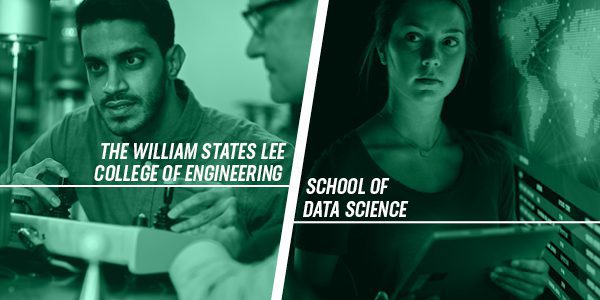UNC Charlotte’s School of Data Science and Lee College of Engineering establish partnership

UNC Charlotte’s School of Data Science and the William States Lee College of Engineering have established a partnership that will benefit both students and faculty with collaborative initiatives and a cross-listed curriculum. A goal of this effort is to enhance engineering graduates’ knowledge and use of data analytics, which has become increasingly integral across the professional spectrum.
This new partnership follows the lead of the other colleges already partnered with the School of Data Science: the Belk College of Business, College of Computer Informatics, College of Liberal Arts & Sciences, and the College of Health and Human Services.
“Engineers use a number of scientific principles to construct buildings, devices, machines, electrical systems, engineering processes and new technologies. In today’s society, the amount of information available to engineers necessitates their ability to analyze these large datasets to make better decisions,” said Rob Keynton, dean of The William States Lee College of Engineering, who joined UNC Charlotte in July 2020 from the University of Louisville. He served as interim executive vice president for research and innovation and the Lutz Endowed Chair of Biomechanical Devices in the Department of Bioengineering at the Speed School of Engineering.
Keynton, along with the School of Data Science’s Executive Director Doug Hague, is excited about the opportunities for interdisciplinary research and education that the partnership provides.
“Students can learn so much from each other, especially students from different disciplines. It helps students gain broader and different perspectives on how to interact with people from other disciplines and solve society’s problems more efficiently,” Keynton said. By having access to this interdisciplinary education, students will develop the skills needed to work on a number of studies related to energy production, advanced manufacturing and autonomous vehicles.”
“Having a diverse team leads to stronger results in research,” Hague said. “Many engineering proposals tend to ask how data science applies to this research.”
Looking ahead, Keynton and Hague aim to accelerate research collaborations between the School of Data Science and the College of Engineering. They also plan to cross-list as many as ten additional courses over the next five years, providing engineering majors with hands-on learning of data science concepts, such as machine learning and artificial intelligence.